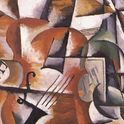Early in Peter Morgan’s new play, Patriots, we meet a man down on his luck. Having lost his job as deputy mayor of St Petersburg, he now drives a taxi. He appears as a suppliant in the office of Boris Berezovsky, an oligarch from whom he previously refused to take a bribe. Berezovsky demolishes his KGB CV—“East Germany is where they generally sent the desk jockeys, the altar boys, the softies, the ‘B’ team…”—but agrees to find him a place working for Boris Yeltsin. The taxi driver’s name is Vladimir Vladimirovich Putin.
Patriots, which finished its run at the Almeida in London in August, will transfer to the Noël Coward Theatre for a 12-week season next May. The play tells the life story of Berezovsky, played by Tom Hollander. Berezovsky’s rise through the fetid waters of post-Soviet capitalism and his later reinvention as a standard-bearer of Russian liberalism ultimately ended when he failed to anticipate Putin’s insistence on absolute submission after he rose to the presidency. Berezovsky’s death in Berkshire in 2013 was initially ruled a suicide; it came shortly after he lost a crushing legal battle with Putin loyalist Roman Abramovich, another of Berezovsky’s former protégés. A later inquest found that the evidence for the cause of death was inconclusive.
Putin’s own theatrical manipulations have been an essential element of his bloodstained career. Is Putin, as he would have Russians believe, the only guarantor of social control and domestic stability against a global backdrop of chaos and violence? Or is he, as writers Catherine Belton and Peter Pomerantsev have suggested, the director of that very chaos, staging terrorist attacks and manipulating reality for his own ends?
Or is he merely an opportunist whose luck has not yet run out? This is the version we get in Patriots, where actor Will Keen’s diffident Putin (pictured) tremors with suppressed anxiety. “Behind this ridiculous strongman image, there must be someone who’s going to burst into tears at any moment,” Keen tells me when we speak on the phone. “So much of capturing the physicality is about the management of internal tension. He taps his foot very slowly while he’s being interviewed, which I believe is an FSB/KGB training thing. You’re trained to be as impassive as possible, but that allows you to just let something out.”
In British theatre, the bar for portraying Putin was set high in 2019 with Lucy Prebble’s extraordinary play A Very Expensive Poison, a sympathetic portrayal of spy-turned-whistleblower Alexander Litvinenko, another Berezovsky associate who was killed by Russian agents in London in 2006. Prebble also researched deeply into Vladislav Surkov, the Putin media guru who trained as an avant-garde theatre director, and the Russian technique of styob, a form of comic nihilism visible in Moscow’s trollish diplomacy. Surkov’s messaging positioned Putin as Russia’s bulwark against “confusion and twilight.”
In Prebble’s play, Putin addresses the audience directly. He tells us a tale of the 2002 Dubrovka theatre siege in which, Prebble’s Putin says, 850 people “in a Moscow theatre much like this” were taken hostage by supposed Chechen Islamists. “A theatre audience. You know better. You know that as soon as anyone starts telling a story, they start telling a lie.” Did Putin set up the entire event? Naturally, he won’t tell us. But don’t we feel a little more unsafe, shuffling together in our seats, eyeing the exits? Don’t we collectively feel a little more dependent on the man on stage? It is one of the most effective moments in 21st-century British theatre.
“Having frightened them, the monologue seeks to forgive the audience for what has been called ‘compassion fatigue,’” Prebble tells me. “You can’t care about everything. So let me do that. Let me take that for you. Let me carry it.” In the 2019 Old Vic production, Reece Shearsmith played Putin. “I’ve often found that pure actors are often less able to conjure the need for total control than those who also direct and write,” says Prebble. “So the fact that Reece is also an author, has a third eye, is somewhere there in his performance.”
But as we become more sophisticated critics of Putin’s own storytelling, there is a case for moving away from portrayals of Putin as an all-controlling author. That’s the strength of Keen’s version. I speak to him just as news breaks that the daughter of Putin loyalist Aleksandr Dugin has been killed in a car bomb. For the first time I can remember, a British newspaper describes such an event as “most likely to be a false flag attack to whip up public support and escalate war against Ukraine.”
What is it like at the heart of that darkness? Keen recalls the stories of a younger Putin in East Germany, “having worked for 16 years for this enormous ideology,” watching the USSR collapse. “Beyond that, there is no moral safety net.”













